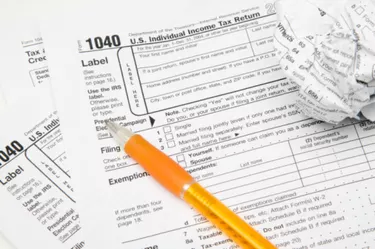
It may be tempting to sign your spouse's name on your joint return if, in your haste to drop it off at the post office before the deadline, you realize it's unsigned. Don't do it. With few exceptions, it is not only forgery but against Internal Revenue Service rules for you to sign for your spouse.
Significance
Video of the Day
When you file a joint tax return, you and your spouse are both agreeing to the accuracy and completeness of the information listed on the return. In addition, you and your spouse are both subject to what the IRS calls joint and several liability. This means the IRS is allowed to pursue you and your spouse both jointly and separately for any underpaid tax or unreported income. Unfortunately, this liability arrangement continues even for couples who divorce after the return is filed. The liability also extends to other unpaid federal debts. For instance, if you and your wife file jointly and she is delinquent in her federal student loan repayments, the IRS can take your refund to repay the student loan debt. Because of the implications of joint liability, the IRS requires that both spouses sign the tax return. In most instances, it is illegal for you to forge the signature of your spouse on the return.
Video of the Day
Considerations
If your spouse is deceased, you are allowed to write in the name in the signature area and add "deceased" next to the decedent's name. The IRS also says to write "deceased" across the top of the return. If you cannot sign your return because you are out of the country or ill, the IRS requires that you assign someone with power of attorney and have that person sign the return on your behalf. To assign a power of attorney, complete IRS Form 2848 and mail it to the address listed in the instructions. You can download the form on the IRS website or order it by calling 800-TAX-FORMS.
Special Circumstances
If your spouse is mentally ill, the return must be signed by a court-appointed representative. However, if you are the legal guardian of your spouse, you may sign on her behalf. If the taxpayer is competent but otherwise unable to fully write his name, the IRS will accept a mark on the return that indicates the taxpayer's intent to sign the return. For example, taxpayers are allowed to sign their returns by making an "X" on them. If your spouse is serving in a combat zone and you do not have a power of attorney, you can attach a signed statement to your return explaining that your spouse is serving in a combat zone..
E-File
For e-filed returns, your electronic personal identification number is considered your joint signature, and no physical signature is required. However, it is still considered forgery to file your spouse's return without consent and approval.